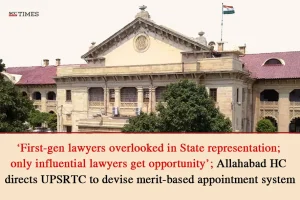Allahabad High Court: In a writ petition filed by the heirs of a deceased bus conductor seeking payment of their father’s dues, the Single Judge Bench of Ajay Bhanot, J., noted that the present petition was eventually filed due to the professional negligence or incompetence of the counsels appointed by the Uttar Pradesh State Road Transport Corporation (‘UPSRTC’) at the Labour Court. The Court further commented on the nature of appointments of counsels for State or State-run corporations, wherein only those lawyers who belonged to influential families were given opportunities. Accordingly, the Court directed UPSRTC to devise a fair and transparent system of appointment by holding a Board Meeting before the next date of hearing.
Background
In 2004, the petitioner’s deceased father was working as a Bus Driver with the UPSRTC. He was suspended and ultimately terminated from the service. Aggrieved, the petitioner’s father raised an Industrial Dispute before the Labour Court. In 2015, the Labour Court ruled ex parte in his favour, and the termination order was declared invalid. However, during the pendency of this case, the petitioner’s father died. Thus, the order of reinstatement could not be passed, and a direction was given to make payment of salary/wages to the legal heirs of the workman from the date of termination of his service.
Aggrieved with the aforesaid order, the UPSRTC filed a writ petition wherein the Court set aside the impugned award and instead granted Rs 1 Lakh compensation to both petitioners. The petitioner filed a recall application, but it was rejected by the Labour Court. Hence, the present petition.
Analysis
At the outset, the Court noted that the present writ petition had arisen on account of a prima facie disobedience of directions of the Court. Upon enquiry, the UPSRTC found that the situation came to a pass due to professional negligence or incompetence of the counsels concerned at the Labour Court. Appropriate action, in this regard, was initiated by the UPSRTC.
Noting the aforesaid, the Court remarked that the appointment of meritorious counsels by a fair and transparent procedure was central to the good governance of a government corporation and consistent with the mandate of constitutional law.
“Hitherto, an entitlement culture has taken root in appointments of counsels for State corporations, where only scions of influential families are given opportunities to represent State corporations. This observation does not take away the competence of any counsel appointed by the Corporation but highlights the decay in the system where these offices are appropriated by those who can peddle influence in the corridors of power.”
The Court further commented that the profession of law does not lend itself to success very easily. Years of industry and ceaseless devotion to legal scholarship are behind the success of lawyers.
“A good number of such first-generation lawyers are very competent, possess unimpeachable integrity, and are industrious by disposition. Counsels of the aforesaid class rarely get a look in when appointments of State counsels or counsels for the Corporations are made, as they are not able to curry any influence with powers that be.”
The Court added that modes of appointment of counsels which accord weight to accidents of inheritance and neglect achievements of merit cannot be countenanced in State Corporations. The Court opined that this culture of appointments had also degraded the professional representation of the Corporations.
The Court further stated that in many cases, the counsels for the Corporations who were appointed through the spoiled system received the notices and did not appear in the Courts. They simply sub-delegate the files entrusted to them.
“In the currently existing system, young first-generation counsels who are not well connected politically or do not belong to influential families are invariably overlooked in appointment as counsels for the State or the State-run Corporations despite their competence and scholarship.”
Furthermore, the Court expressed that the failure of the State instrumentalities to discern merit in such a class of counsels could be disheartening to young first-generation lawyers who were neither connected politically nor belonged to families that were positioned high up in the power pyramid. Such an environment prevents members of the Bar from developing and contributing to the rule of law. The unjust nature of the system has serious adverse consequences on governance by law. The justice delivery system becomes weak and unable to serve justice to the citizens due to systemic deficiencies.
The Court added that it was the responsibility of all State authorities to uphold the rule of law and fairness. Selections of counsels can only be done by independent and dispassionate observance of Court proceedings by officials of the Corporation who are regularly present incognito in Court. The procedure thereafter demands a rigorous system of checks and balances on the professional competence and integrity of counsels. However, the Court stated that selection methods were a matter of detail, which the authorities could evolve based on the institutional experience as well.
Regarding the UPSRTC’s assurance that all endeavours shall be made to ensure that the best talent from the Bar was considered while making such appointments, the Court stated that a system, which adopted transparent procedures, promoted merit, and gave a fair chance to young first-generation lawyers, while appointing counsels for UPSRTC, had to be devised by UPSRTC. For this purpose, the Court directed that the meeting of the UPSRTC Board shall be held before the next date of hearing, and the scheme shall be finalised to be presented before the Court on the next date. The Court further directed the Managing Director, UPSRTC, to file an affidavit on the next date. The counter affidavit shall also be filed before the next date of listing.
Accordingly, the matter was listed for 22-09-2025.
[Jubeda Begum v. U.P. State Road Transport, 2025 SCC OnLine All 5053, decided on 04-08-2025]
Advocates who appeared in this case:
For the petitioner: Yogesh Kumar Vaish
For the respondent: Sheo Ram Singh and Sunil Kumar Misra

